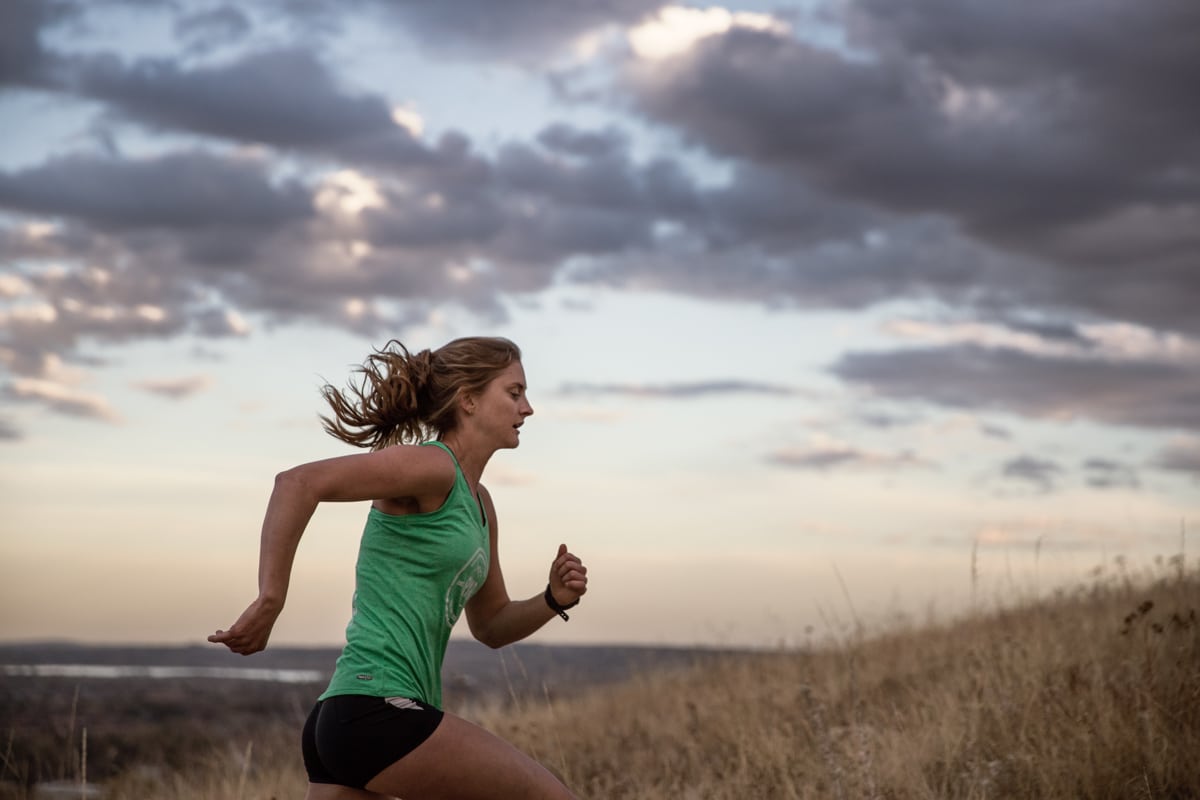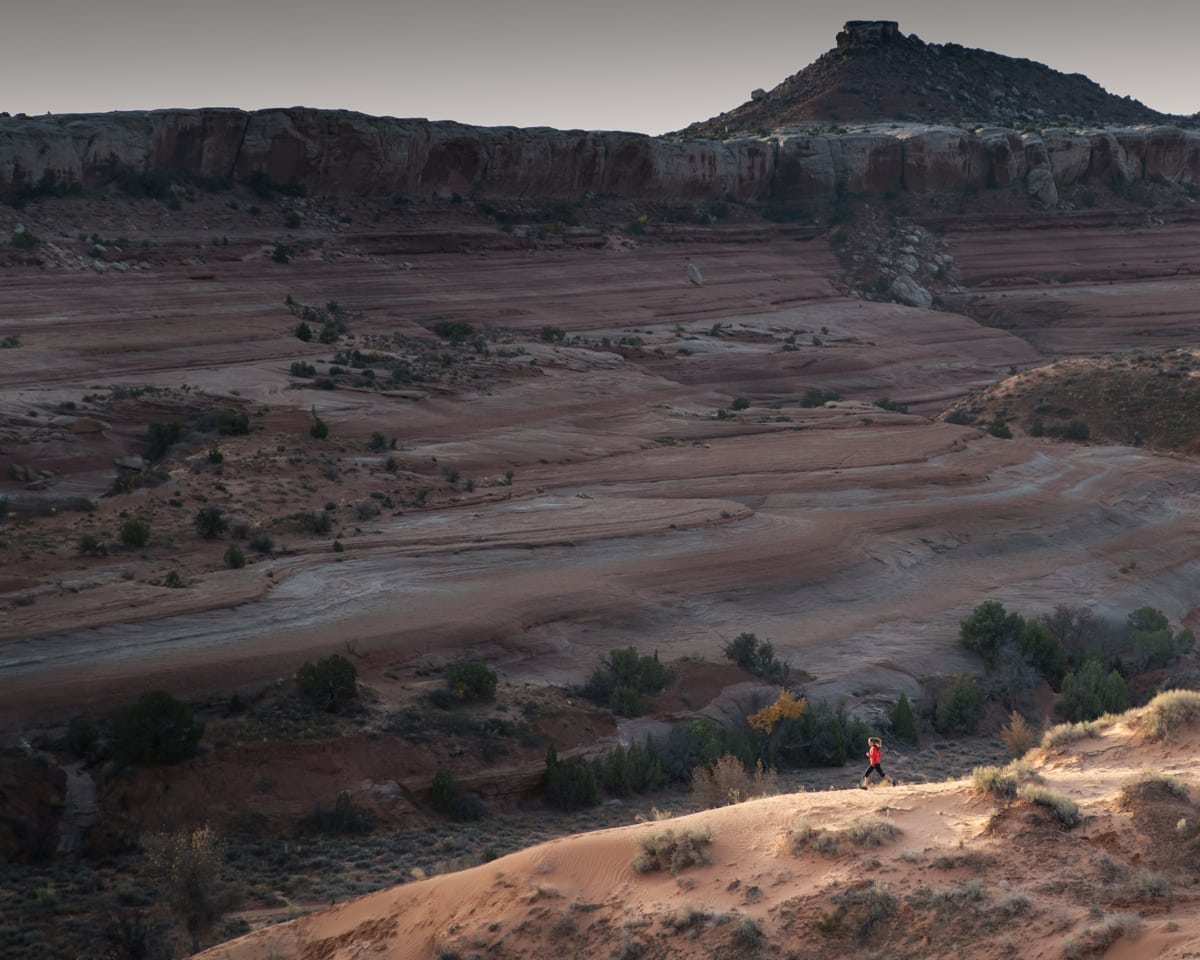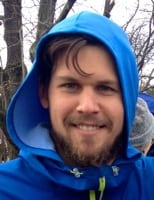Clare Gallagher cares deeply about a lot of environmental issues. The 26 year old is concerned with sustainable palm-oil harvesting, and deforestation, and overpopulation, and animal rights, and the health of the ocean’s ecosystem, and climate change, and… Let’s say that she has a lot of concern for the environment. When she speaks about the many environmental topics she cares about, her eyes widen, her face brightens, the rhythm of her voice quickens, and you can feel that her passion is deep and sincere. When you listen to Clare Gallagher speak, you know you are listening to an activist at work:
Gallagher, currently living Boulder, Colorado, secured a course-record win at the 2017 CCC and a second-place finish at the highly competitive 2017 The North Face Endurance Challenge 50 Mile Championships. She is, by all accounts, a stand-out ultra-distance runner. She is also an environmental activist.
Gallagher grew up in a suburb of Denver, Colorado and she often spent the weekends with her family in the mountains. From an early age, she was connected to her local wild places. At the impressionable age of 18, she went east to Princeton University where she began researching the ocean’s coral health. Then, she took an environmental-ethics course with perhaps the greatest living ethicist, Peter Singer. For his groundbreaking research and thought-provoking views on bioethics, animal welfare, and global poverty, Singer, an Australian citizen, was appointed a Companion of the Order of Australia in 2012. With his renowned books, Animal Liberation (1975) and The Life You Can Save (2009), Singer has perhaps converted more people to vegetarianism—including this author—than any other person. It was from Singer that Gallagher first learned about the ethics of the environment and the concept of moral obligation. During her junior year, the topic of palm-oil plantations, and how unsustainable and detrimental to the environment they are, was heavily discussed in one of Singer’s courses, and Gallagher found herself seriously interested. The conversation only continued from there, from palm oil to sustainable forestry, overpopulation, and resource distribution.
Suddenly, Gallagher had a lot to think about. If Gallagher was in a position to help the planet and its people, wasn’t she obligated to do so? Yes, she believed, “I realized that I have a duty, living on this planet, to clue into these issues. The ethics of the environment are what keep me up at night, and what I wake up thinking about.”

Clare Gallagher lives in Boulder, Colorado, where she runs on public lands on a daily basis and advocates for them nearly as often. Photo: Grayson Schaffer
In fact, her sense of obligation toward the planet was strong enough that it sent her to Thailand after college. She first taught English for a year as a fellow for Princeton in Asia, a nonprofit associated with her alma mater, and then she spent a year teaching students about marine conservation and water safety. In other words, Gallagher dropped everything to move across the world and work on Thailand’s environmental issues. If actions speak louder than words, Gallagher, at a relatively young age, was speaking with the caps lock on and exclamation marks blazing.
She continued running some while there, and even ran her first ultramarathon in Thailand, but she missed her Colorado community and the beauty of the mountains that she had always called home. After two years in Thailand, these concerns, and the impotent feeling she had toward the depth and seriousness of the environmental problems facing the tropics, led Gallagher back to her home state of Colorado.
Gallagher elaborates, “I got depressed about the state of the environment as a whole. Once I was back in Colorado, in these arid mountains, I could take a deep breath and say, ‘Okay, there are little things we can begin to chip off this iceberg. I don’t have to be a martyr in the tropics and not run and not have my community and not speak English.’”
Once she was back amongst her group of friends, running familiar terrain, her ultrarunning career took off with a win at the 2016 Leadville Trail 100 Mile. If you’ve met her in person or follow her social media, then you already know that Gallagher is a very likable person. It’s no surprise that people are willing to listen to her, especially given her considerable successes as a trail and ultrarunner. Gallagher, I think, recognizes this too. And so, as Gallagher began to gain notoriety and attention among trail and ultrarunners, she saw an opportunity to spread awareness about the environmental issues she holds dear. Although running soon became Gallagher’s full-time job, she has used her influential position to discuss issues she finds much more important.
If you know her or have followed her online for a while, then you probably also know that the idea of using wild spaces, and running on public trails, and increasing her carbon footprint, and doing nothing to give back or mitigate the negative effects of her running career, doesn’t sit well with her. Gallagher makes the point more succinctly, “[Once running took off,] I started to try to justify the way I was spending my time. Ultrarunning is inherently selfish and time consuming. There are tons of benefits, of course, but if I can connect these deeper [environmental] issues that I care about with my running, then I can be a runner but also be working toward something bigger and more important.”
At the end of the day, however, Gallagher is pragmatic. Her public stance toward environmental topics has been purposeful. Her following, after all, largely consists of trail runners and outdoors enthusiasts and people who use human-powered means to explore beautiful, vast public spaces for fun. And many, if not most, are from the United States.
“How do you talk about all these issues related to the environment with [these sorts of people], and get them to care? You can’t talk about every global or national problem constantly. I already feel like I exhaust myself and people I’m around [laughs] with morose thinking. So, it’s like, ‘What’s tangible? What can we think about? Let’s think about a gate being put up on a trail that you like to run on. How does that make you feel?’” she asks, tactically.
To put the point differently, Gallagher wants her fans, friends, and followers—people who use public trails and open spaces—to explore how they can be more than just takers. How can we appreciate what we’re using? How can we learn about the places we explore, so that we might also improve them? There are a massive of list of issues that a given person can care about, and Gallagher cares about a ton of them.
But, ever the pragmatist, rather than shoving arguments about overpopulation or rising sea levels down people’s throats, for now Gallagher is focusing on the issues that most directly affect her followers and the people she interacts with most—trail runners and mountain users. If you couldn’t ski in Colorado because there was no longer snow in the winter, how would you like that? If the land containing public trails that you love to run were sold and put into private hands, and the trails were no longer available, what would you think about that?
As Gallagher puts it: “On the whole, I’d like to talk about the grittier issues that are more important than access to trails, but that being said, I have to know my audience and the platform I have right now, and that’s trail runners. So, I have to start locally. That’s why I’m vocal about those pertinent issues, because I think they’re gateways to much bigger problems that more humans should be thinking about.”
If Gallagher is an environmental activist, and she’s a pragmatic one, then she’s also a proactive one. Her calls for action are authentic and actively pursued, as she’s taking big steps with local and national organizations to help tackle the issues she’s passionate about. Gallagher is an ambassador for Winter Wildlands Alliance (WWA), a national nonprofit organization that seeks to preserve winter wildlands and human-powered snow sports on public lands. Along with nearly two dozen other winter-sports athletes turned ambassadors, Gallagher serves as a link between winter-related environmental issues and the public. Her hope is to influence people to act on the issues that WWA tackles. Perhaps you are a winter-weather sports fan, and perhaps you would be outraged if North American winters became obsolete. Perhaps you’re a fan of Clare Gallagher and she’s motivated you to act.
Gallagher is also formally aligned with a Boulder-based organization called Protect Our Winters (POW). POW focuses on mitigating the effects of climate change by influencing state legislation and educating communities. To help mobilize individuals and communities toward environmental activism, Gallagher joined what’s called the POW Riders Alliance. Through her relationship with POW and their Hot Planet, Cool Athletes initiative, Gallagher gives talks at schools to educate students about the detrimental effects of climate change on the planet. When Gallagher talks about POW, she gets seriously psyched. POW is campaigning and working to enact legislation on policies that Gallagher thinks can truly be impactful—like investing in solar energy or implementing public-transit solutions to minimize carbon emissions. She’s blunt about how you can help: “If there is one organization that you could give money to, and you would know that that money would be put toward a policy agenda that could genuinely have a chance of being implemented, POW is that organization.”
Aside from formal partnerships with organizations, Gallagher sees progress on environmental issues in very small, tangible steps that are accessible to everyone. Ultimately, Gallagher thinks that individuals can have a considerable influence on these topics when they are informed.
“In a lot of ways, I think we need to be better Googlers,” Gallagher explains. “It’s amazing what you can do with a search engine. Search ‘public trails’ and enter your county. You can find out what’s going on. I don’t read every environmental article in The New York Times by any means, but getting some information goes a long way.”
You might find out, for example, that there’s proposal on the upcoming ballot in your county that would earmark $80 million dollars for parks and recreation services. You might not have known that without deciding to search ‘public trails’ and your county. And you might think it’s important to have more parks and more recreational facilities, since that’s likely to improve the health of your county’s citizens, and you so might want to let other people know about the upcoming vote.
Gallagher says that folks in the trail running community can also gain information on topics important to us by asking people around us at races or on group runs. “Ask. People love to talk about this stuff. They’ll talk your ear off about it. I think having more of those conversations would benefit the community,” Gallagher insists. Information breeds understanding, understanding leads to caring, and caring precedes action—and it’s this kinetic chain that Gallagher works to energize in the people around her.
Gallagher also recognizes that it would be easier for trail runners to get informed and take action if there was a unified environmental organization in trail running. Wouldn’t it be easier if there was one website covering all these topics, organizations, and information? And what if it’s a full-on trail runners’ environmental organization with exciting advocacy efforts that you could join in on, too? Gallagher, along with others in the trail running community, are working on it now.
“I hope in the next year that trail running will see a unified organization that has all [this]. I think there’s a huge need for it. The space is there. It should happen and I’m working on it [with others],” Gallagher explains.
At some point, Gallagher’s passion for the planet’s health will lead her somewhere beyond the world of competitive ultrarunning. It might mean that we’ll see her pursuing a position in local government, or it might mean that someday she’ll work for an environment-focused nonprofit. But no matter what path Gallagher chooses, we can certainly expect her to be vocal about environmental issues, to work passionately to bring about change, and to be candid with her informed beliefs. For the moment, she’ll continue to focus on the issues that most closely impact the lives of trail runners and mountain lovers.
To that audience, she has this to say: “If [runners] care about any benefits they receive from the environment, then they should care about the issues that surround them…When people are like, ‘I just don’t have time to care.’ Then, it’s like, you have to sacrifice your run every day outside. That means you need to run on a treadmill every day if you’re not willing to read and care about the trails you’re running on.”
Clare Gallagher is an environmental activist. She is a pragmatic and proactive environmental activist. She thinks that you should be, too.
Call for Comments (from Meghan)
- Have you seen Clare Gallagher’s activism in action?
- Does Clare’s passion about the environment rub off on you? What messages has she shared that have been particularly powerful or meaningful for you? Have you taken action on an issue because of something you’ve learned from her?
- What do you think about the relationship between trail running and environmental activism? Should they be linked? Should we as outdoor users be more active in advocating for the places we play?


